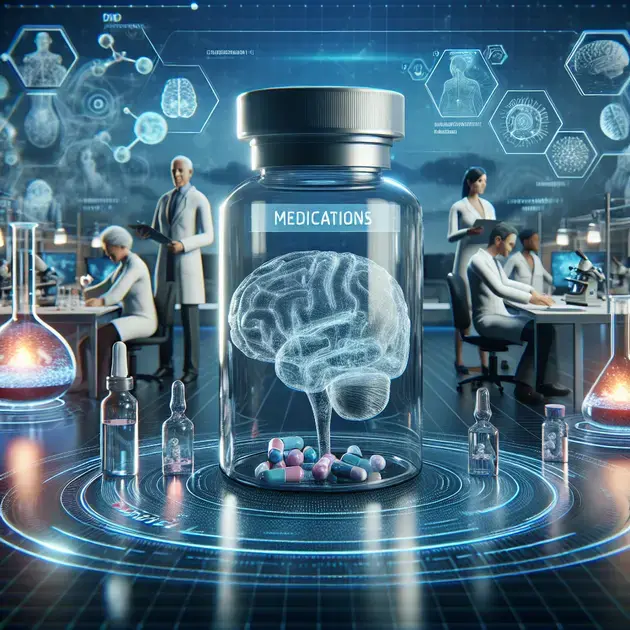Are you looking for a comprehensive guide to effective Alzheimer medicines? Look no further, as we delve into the latest advancements in the treatment of this challenging condition.
Alzheimer’s disease is a progressive brain disorder that affects millions worldwide. As researchers continue to explore innovative medications, it is essential to stay informed about the most effective options available today.

**Understanding Alzheimer’s Medications**
Introduction to Alzheimer’s Medications
When it comes to treating Alzheimer’s disease, medications play a crucial role in managing symptoms and slowing down the progression of the condition. One of the key factors to consider when understanding Alzheimer’s medications is to have a clear understanding of how these drugs work and what to expect from them.
Step-by-Step Guide:
1. Consult with a healthcare professional or neurologist to determine the most appropriate medication for the individual’s condition. Websites like the Alzheimer’s Association (https://www.alz.org/) provide detailed information on the various types of medications available.
2. Understand the different classes of Alzheimer’s medications, such as cholinesterase inhibitors and memantine, and how they target specific symptoms of the disease. Websites like WebMD (https://www.webmd.com/) offer in-depth articles on these drug classes.
3. Research potential side effects and interactions of Alzheimer’s medications. Reliable sources like Drugs.com (https://www.drugs.com/) provide comprehensive information on side effects, drug interactions, and precautions to be aware of.
4. Follow the prescribed dosage and schedule for Alzheimer’s medications to ensure optimal effectiveness. Utilize medication reminder apps like Mango Health (https://www.mangohealth.com/) to help track doses and timings.
5. Regularly communicate with the healthcare provider to monitor the response to Alzheimer’s medications and make any necessary adjustments to the treatment plan. Websites like Healthline (https://www.healthline.com/) offer guidance on communicating effectively with healthcare professionals.
Key Factors to Consider in Alzheimer’s Medications
When considering Alzheimer’s medications, several key factors play a significant role in determining the most suitable treatment approach for individuals with the disease. Understanding these factors can help in making informed decisions regarding medication management.
Step-by-Step Guide:
1. Evaluate the stage and progression of Alzheimer’s disease to determine the appropriate medication regimen. Websites like Mayo Clinic (https://www.mayoclinic.org/) offer guidelines on matching medications to the specific stage of the disease.
2. Consider the individual’s overall health condition and any existing medical issues before starting Alzheimer’s medications. Resources like the National Institute on Aging (https://www.nia.nih.gov/) provide insights into considerations for medication management in older adults.
3. Discuss potential benefits and risks of Alzheimer’s medications with the healthcare provider to weigh the advantages against possible side effects. Websites like Medscape (https://www.medscape.com/) offer expert insights on medication considerations.
4. Take into account the cost and insurance coverage of Alzheimer’s medications when selecting a treatment plan. Utilize platforms like GoodRx (https://www.goodrx.com/) to compare medication prices and find discounts.
5. Stay informed about emerging research and developments in Alzheimer’s medications to explore new treatment options. Websites like ClinicalTrials.gov (https://clinicaltrials.gov/) provide information on ongoing clinical trials for Alzheimer’s treatments.
Latest Advances in Alzheimer’s Treatment
As research continues to evolve, new advancements in Alzheimer’s treatment offer hope for improved outcomes and quality of life for individuals with the disease. Staying updated on the latest developments can provide valuable insights into innovative approaches to managing Alzheimer’s.
Step-by-Step Guide:
1. Explore the use of personalized medicine and precision therapies in Alzheimer’s treatment to target the individual’s unique genetic and biological factors. Resources like Alzforum (https://www.alzforum.org/) offer updates on personalized treatment approaches.
2. Learn about experimental drugs and therapies being investigated in clinical trials for Alzheimer’s treatment. Websites like the Alzheimer’s Drug Discovery Foundation (https://www.alzdiscovery.org/) provide information on upcoming treatment options.
3. Stay informed about breakthrough technologies, such as wearable devices and digital health solutions, that can aid in monitoring and managing Alzheimer’s symptoms. Platforms like Being Patient (https://www.beingpatient.com/) cover the latest tech advancements in Alzheimer’s care.
4. Engage in discussions with healthcare providers and researchers to understand the potential of immunotherapy and gene therapy in Alzheimer’s treatment. Websites like the Alzheimer’s Research Forum (https://www.alzforum.org/) offer insights into the latest treatment modalities.
5. Participate in Alzheimer’s advocacy and awareness campaigns to support research efforts and access cutting-edge treatment options. Organizations like the Alzheimer’s Association (https://www.alz.org/) provide resources for getting involved in advancing Alzheimer’s treatment.

Understanding Alzheimer’s Medications
When it comes to understanding Alzheimer’s medications, it is crucial to consider the key factors that play a role in the treatment of this condition. Alzheimer’s disease is a complex neurodegenerative disorder that affects millions of people worldwide. Medications for Alzheimer’s aim to manage symptoms, slow down the progression of the disease, and improve the quality of life for patients. One important factor to consider is the different types of medications available for Alzheimer’s treatment.
There are several classes of drugs commonly prescribed for Alzheimer’s, including cholinesterase inhibitors and NMDA receptor antagonists. Cholinesterase inhibitors work by increasing levels of acetylcholine, a neurotransmitter that is reduced in Alzheimer’s patients. NMDA receptor antagonists, on the other hand, regulate glutamate, another neurotransmitter involved in learning and memory.
Another key factor to consider is the stage of Alzheimer’s disease when medication is initiated. Medications may be more effective in the early stages of the disease, when symptoms are mild. However, they can still be beneficial in later stages to help manage behavioral and cognitive symptoms.
It is also important to take into account the potential side effects of Alzheimer’s medications. While these drugs can be helpful in managing symptoms, they may also come with side effects such as nausea, diarrhea, or dizziness. Understanding the risks and benefits of each medication is essential in personalized treatment plans.
In conclusion, understanding Alzheimer’s medications involves considering the types of drugs available, the stage of the disease, and the potential side effects. By addressing these key factors, healthcare providers can develop effective treatment strategies for patients with Alzheimer’s disease.
Latest Advances in Alzheimer’s Treatment
Recent years have seen significant advancements in Alzheimer’s treatment, offering hope to patients and their families. Researchers and pharmaceutical companies are continuously working on developing new therapies and medications to target the underlying mechanisms of the disease. These latest advances focus on addressing the beta-amyloid plaques and neurofibrillary tangles that are characteristic of Alzheimer’s.
One promising area of research is the development of monoclonal antibodies that can target and remove beta-amyloid plaques from the brain. These antibodies have shown potential in slowing down the progression of Alzheimer’s and improving cognitive function in clinical trials.
Another exciting development is the use of tau protein-targeting therapies to combat neurofibrillary tangles in the brain. Tau protein abnormalities are closely linked to Alzheimer’s progression, and drugs targeting tau are being investigated as a potential treatment strategy.
Furthermore, gene therapy and stem cell therapy are emerging as innovative approaches to Alzheimer’s treatment. Gene therapy aims to modify genes associated with Alzheimer’s risk factors, while stem cell therapy focuses on regenerating damaged brain cells and promoting neural repair.
Overall, the latest advances in Alzheimer’s treatment offer new possibilities for managing the disease and improving the quality of life for patients. While more research is needed to fully understand the efficacy and safety of these treatments, the progress made so far is a promising step towards finding a cure for Alzheimer’s.
Conclusion
Understanding Alzheimer’s medications involves considering the types of drugs available, the stage of the disease, and the potential side effects. By addressing these key factors, healthcare providers can develop effective treatment strategies for patients with Alzheimer’s disease. Medications play a crucial role in managing symptoms, slowing down disease progression, and improving patients’ quality of life. Cholinesterase inhibitors and NMDA receptor antagonists are commonly prescribed classes of drugs that target neurotransmitters affected in Alzheimer’s patients.
It is essential to consider the stage at which medication is initiated, as early intervention can be more effective in managing mild symptoms. However, even in later stages, medications can help manage behavioral and cognitive symptoms. Despite their benefits, Alzheimer’s medications may come with side effects like nausea, diarrhea, or dizziness. Understanding the risks and benefits of each drug is vital in tailoring treatment plans to individual patients.
In the realm of Alzheimer’s treatment advancements, researchers are exploring innovative therapies targeting beta-amyloid plaques and neurofibrillary tangles, hallmarks of the disease. Monoclonal antibodies show promise in removing beta-amyloid plaques and improving cognitive function. Additionally, tau protein-targeting therapies aim to combat neurofibrillary tangles, contributing to the development of potential treatment strategies. Gene therapy and stem cell therapy are emerging as novel approaches to Alzheimer’s treatment, focusing on modifying genes and regenerating brain cells.